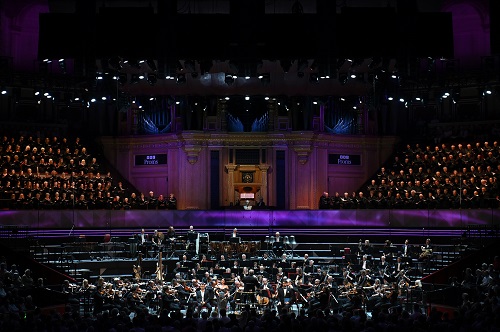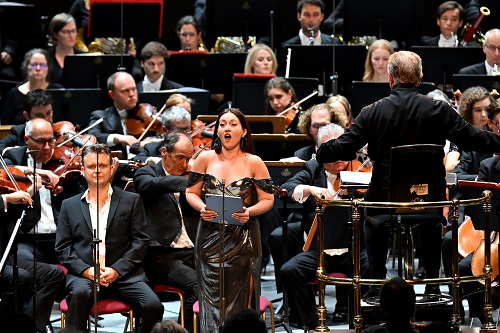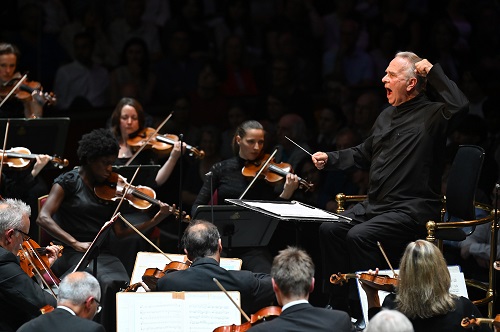Longevity clearly matters. I do not mean in the age of its conductors, although this sometimes is important, but by the length of time they have spent with their orchestras. Sir Mark Elder is now into his twenty-third year with Manchester’s Hallé orchestra – and it tells. It wasn’t so much the precision of the playing of this Prom which was so impressive; it was the sense of a conductor and an orchestra in complete harmony, a connectivity that made this orchestra play with extraordinary finesse and expression that was clearly at one with the vision of its conductor. This is rare in most concerts – but in this particular one it produced two of the most exquisite performances of either work on this programme I have heard in many, many years.
Elder conducts from a stool these days – Klemperer style. And he does, in fact, have quite a few things in common with that rather monolithic – sometimes immobile – conductor. Klemperer, despite his reputation for producing rather heavy, grinding performances, could also produce ones of chamber-like clarity, with effortless grace and lightness. It is rather what we got with Elder’s performance of Serge Rachmaninoff’s The Bells (light years away from the one I heard a few months ago with the Philharmonia Orchestra and Stanislav Kochanovsky). The Shostakovich symphony too – the Fifth – was fascinating for its astonishing power – but also its willingness to dig deep to achieve intensity (especially in a Largo of searing rawness). If there is one thing Elder’s Hallé perhaps shared with Klemperer’s Philharmonia it is the concept of the orchestra as a vast instrument of chamber players. There was little wonder he looked shattered at the end of this concert because it often felt he had been conducting individual players not a full symphony orchestra.
The Royal Albert Hall can be an unforgiving acoustic except, I think, for choral works where it sometimes allows for them to blossom: it is, after all, built like a classical amphitheatre from the inside (even if it is still a Coliseum under repair on the outside). The Bells might not be the vastest of choral works but it benefited from the airiness and openness of the spaces; the choirs were placed, left and right, at a slight curve rather than facing straight towards the audience. It benefited the soloists hugely, since none were buried beneath a wave of sound hurling towards them. What also turned out to be crucial in this performance was Elder’s decision to divide his violins (something which Kochanovsky had not done with the Philharmonia).

Although written in 1913, The Bells is an autobiographical work. In a sense the work is perfect distillation of Rachmaninoff himself – it travels from youth to death and from joy to sorrow and was composed in the solitude of a summer in Rome. Apart from the Edgar Allan Poe poem on which the text is based, it’s the mournfulness of the bells which largely attracted Rachmaninoff; the vibrations of the sound, the moods they inspired in him, and ultimately the conflicts of their meanings – from the joyfulness of marriage (although even this is seen in rather impassive ways) to the Dies irae, a life-long influence in his works.
If we accept that The Bells is a choral symphony then perhaps its model is Tchaikovsky’s Sixth Symphony; Rachmaninoff cannot, in part, have escaped the influence since he had been staying in the same apartment in Rome once occupied by Tchaikovsky. The autobiography of the two works is, of course, obvious, if very different – but so, too, is their relative greatness as works of musical form, power and emotion.
There was, I think, something very organic, very symphonic about Mark Elder’s performance of this work. It was certainly, for example, extremely tightly conceived; it was so well balanced between the choral and orchestral elements it felt distinctly woven together. I sometimes get the impression when I listen to The Bells of hearing the orchestra one moment, the chorus the next – but without any sense of the two melting together to form a singular sound. This was not the case here and this was why the performance was of such spellbinding quality.
The acoustic of the hall made Elder’s superb detail of the woodwind’s tremolos depicting the sleigh bells sound just magical; but place this beside Dmytro Popov’s hushed, purring entry before the fortissimo entry of the chorus and it was just dynamic. Popov was tremendous – never overwhelmed by the chorus when the climax returned, but fused into it. Where so many tenors just disappear, consumed by the blaze of fire from the choral forces, Popov forged through them like an axe through steel. A sublime contrast to the silvery string figures of the Dies irae from the orchestra that suggested mortality in the most breath-taking terms.

Mané Galoyan, the soprano, was a touch hesitant in her initial entry in the second movement Lento but this soon turned into exactly what the words of the text tell us the music is about – golden wedding bells. The inherent beauty of the playing – sublime, yet icy strings, terrifying, yet golden trumpets – masked one menacing irony: even though this was happiness in marriage there was still dread and death to bear. Galoyan displayed astonishing range and depth, colour and perception; this was amongst the most gripping performances by a soprano of this movement I have yet heard in this work in a live concert. The poignancy that love and marriage, and life and death, coexist felt both tragic and illuminating.
Having had the silver and golden bells, the Presto gave us a magnificent portrait of the bronze bells for chorus and orchestra. It was that tightness, the melding of orchestra and choral forces, that allowed Elder to create a formidable sense of tension here: torment, and the sense that the chorus were seizing on terror to mirror the power from the orchestra was just thrilling. It could have been excessive, perhaps overdone; instead, it felt exactly appropriate to the scale of the tolling bells, their exact vibration, their accents, their despair. If this was music that nears the apocalyptic it almost touched it here.
The Lento lugubre begins in despair (on the cor anglais) but ends on a ray of hope. For Elder there was something very melancholic, almost grief-stricken, about how he opened this movement; one wondered if the music would even achieve the reconciliation of happiness it is intended to. Andrei Kymach, the baritone, had some of the bleakest singing of the work. Not all voices have the right timbre for it, but the shrouded darkness, that cloak of velvet heaviness that he had, were just enough to make us feel uncomfortable and on edge in his requiem of the Dies irae. He worked superbly, too, with the chorus; when they imitate the bells, mouths closed, Kymach plummeted into a final surrender to them, yielding his voice to a desolation that was like the final fading vibration of the bell itself.
It’s in the orchestra that Rachmaninoff tries to rectify the melancholy of this movement and I think Elder was a little equivocal here. The strings were perhaps a little too icy, perhaps intentionally so to avoid the idea that the opening gloom hasn’t been entirely erased. It felt in many ways a viable ending to a performance that had been superlative with choirs – the BBC Symphony Chorus and Hallé Choir – on simply wonderful form, a trio of soloists who had been perfectly cast and an orchestra and conductor in perfect unison.
The performance of Shostakovich’s Fifth Symphony was hardly less fine. Written in 1937 it is a very Stalinist work – a direct response to the problems he received for both the overtly violent, graphic and dissonant Fourth Symphony and his opera Lady Macbeth of Mtensk. But the Fifth is a bit of an illusion. Beneath the surface it is just as dark, just as menacing, just as gruesome as the Fourth – with the added potency of a searing slow movement.

Elder took a quite bipolar view of this symphony in one sense. The opening, for example, had been rather visceral, even quite sour in its textures, with woodwind perhaps slightly on the vinegary side; even the strings were etiolated rather than warmer in tone which one might have expected more from a western orchestra. Yet, when the music became broader – the pulsing string rhythms, or long phrases – there was a depth to the bowing that produced a huge sound. I f this had all been built up like a great pyramid, the entry of thundering chords on the piano brought a shattering climax from Elder and the Hallé that was just thrilling. It was brutal, laden with terror: snare drums rattled like bones, hard sticks pummelled against timpani, trombones and trumpets blazed and strings were as grey and heavy as steel. There was a molten, electrifying fierceness to this Development section that shattered the pyramid that Elder and the orchestra had so deftly constructed before it. When the music began to slow down it felt like the fire in a furnace begin to die out; an echo of the pianissimo that would close out the first movement.
The Allegretto was all parody; humorous flutes and oboes, shimmering strings, the wit of a dance. The tempo was judged to perfection. The Largo was exceptionally well done. There was desolation here – not just in the tragedy of the flutes and oboes, but also in the sparing, wiry intensity of strings which often felt as if they were in a state of permanent lament. If there was beauty in the playing – which there was in spades – it was tinged with an inherent sadness. Even the pastoral music had a certain bleakness. But there was time for Elder to create moments of glorious surprise; the sudden eruption of the velvety strings over the timpani rolls, for example, that felt like the introduction of a hymn. Here the strings took on a magisterial depth that was full-bodied and rich. Violins, violas and cellos playing just with clarinets had a magnificent sublimity: the richness and colour both crystalline and lucid. The tranquil closing pages were like a slow whisper.
Whatever the contextual meaning of the Allegro non troppo, Elder’s view of it – certainly of the closing pages – didn’t necessarily come to a conclusion of ultimate victory. The Hallé were superlative in this movement; the playing was incendiary. But it was that ending which was the most interesting section. Elder took it slower than many conductors tend to – and this gave the music considerably more power. It sounded astonishingly relentless, more catastrophic than it did ultimately satisfying. Perhaps this, in the end, was why the performance did become one that was so remarkable.
A superlative concert: one of the best Proms I have heard for quite some years.
Marc Bridle
Rachmaninoff – The Bells, Shostakovich – Symphony No.5 in D minor Op.47
Mané Galoyan (soprano), Dmytro Popov (tenor), Andrei Kymach (baritone), BBC Symphony Chorus, Hallé Choir, Hallé, Sir Mark Elder (conductor)
Royal Albert Hall, London; Wednesday 26th July 2023.
ABOVE: Dmytro Popov, Mark Elder and the Hallé (c) BBC / Chris Christodoulou